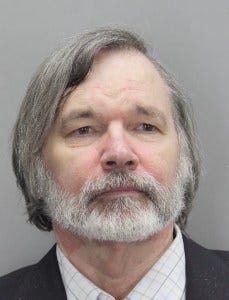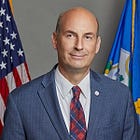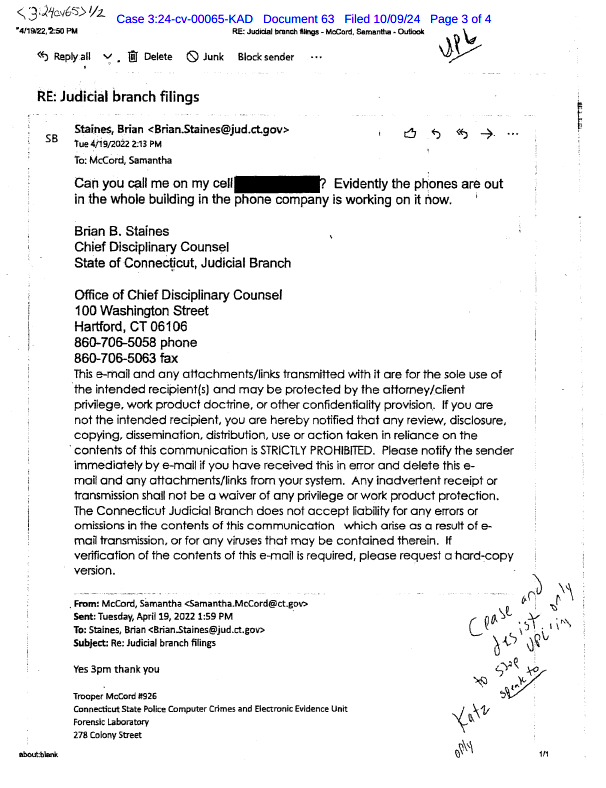Connecticut’s Weaponized Prosecution: Family Court Circus Blogger's Battle Rages
Lawfare, Weaponized Justice, and Legal Landmines: The Paul Boyne Case invites DOJ intervention into the Troubled CT State Courts
By Richard Luthmann
NOTE: This article was updated to include a response from the Connecticut Public Defenders’ Office.
Family Court blogger Paul Boyne is back in Virginia, but his fight against Connecticut’s legal system is far from over. The controversial figure behind the Family Court Circus Blog (FCCB) (thefamilycourtcircus.com) spent 18 months behind bars for incendiary posts about Connecticut judges. He still maintains he was and is exposing a corrupt Family Court system.
Boyne was arrested on the instant charges in July 2023. The last entry on the site covering Family Court content was a July 19, 2023 post entitled Berserk Ball.
On January 16, 2025, he was released from New Haven state court on bail.
Now that he’s out, there are new FCCB stories:
Judge Joseph Vizcarrondo on January 18
TRUMP! on January 20
Re-Engineering Family Court on January 26
Not So Bright on January 27
Free Speech on January 29
Anti-Family Court Vigilantes on January 30
Boyne is back to critiquing the Family Courts and exposing corruption, particularly in Connecticut. It is his free speech right.
Now, Boyne faces a critical decision: Will he methodically dismantle the charges against him using the procedural tools available, or will he continue waging a broader legal war against the system?
Boyne’s return home comes with a catch. He is under electronic monitoring, a condition he calls both punitive and unnecessary.
“I could visit you in Chicago,” he told journalist Michael Volpe, pointing out that he has no travel restrictions despite the ankle monitor that causes him pain and infection.
But the real question remains: Why hasn’t Boyne’s legal team pursued the most effective strategy to kill the case?
Connecticut law provides a clear path for him to depose key figures in his prosecution, yet his attorneys have failed to take action. Is it incompetence, cowardice, or something worse?
Boyne’s Secret Weapon: Depositions That Could Blow the Case Apart
Boyne’s legal team is sitting on a nuclear option they haven’t used—CGS § 54-86, a Connecticut law that allows criminal defendants to compel depositions of essential witnesses.
If executed, this statute would force Judges Jane Grossman, Elizabeth Stewart, former Judge Thomas Moukawsher, Detective Samantha McCord, and former Connecticut Supreme Court Justice Joette Katz to testify under oath.
Forcing these judges to answer questions under penalty of perjury would immediately shift the balance of power in the case.
The biggest question is why State's Attorney Jack Doyle is prosecuting these three separate cyberstalking accusations from three locations in New Haven.
If Boyne’s attorneys filed for these depositions and they were denied, the case would instantly become a significant appellate issue—one that could even draw the attention of the Trump Department of Justice.
Boyne is baffled as to why his lawyers haven’t pushed for this.
“Kelly [Billings] and Denis [O’Malley] are nice folks, but constitutional law is not their competence,” he wrote in an email to the Connecticut Public Defender’s Office.
“They ignore all my requests, act on principles alien to due process, can’t count to the First Amendment, pretend the 14th does not exist, and are too timid to challenge jurisdiction or move to disqualify a rogue judge.”
Boyne’s team can take the case to the Connecticut Appellate Court and even the U.S. Supreme Court if the depositions are denied. The procedural flaws in his prosecution are glaring, but time is running out for his legal team to make their move.
McCord’s "KATZ SPEAK TO ONLY" Email: Evidence of Prosecutorial Misconduct?
Another potential bombshell for Boyne’s defense is an email uncovered in discovery. Handwritten notes on the email read, “KATZ SPEAK TO ONLY,” a reference to Joette Katz, the former Connecticut Supreme Court Justice.
This raises a deeply troubling question: Was Boyne’s prosecution directed by the judiciary rather than the executive branch? If so, this is no longer just a case of judicial overreach—it is an outright constitutional crisis.
Boyne believes Katz has been the mastermind behind his prosecution from the beginning.
“She’s weaponizing the judiciary to silence me,” he said. “This isn’t about safety. It’s about shutting me up.”
If the Connecticut courts deny Boyne’s right to depose Katz and Detective McCord, this could become a case of weaponized justice. This legal scandal goes beyond Boyne and exposes systemic corruption in Connecticut’s courts.
Boyne’s Lawyers: A Wounded Duck Strategy Instead of an Offensive Attack
While Boyne has been clear about his strategy—challenging the jurisdictional flaws and using depositions to force the case to collapse—his lawyers appear to be taking a passive approach. Instead of going on the offensive, they have focused on minor bond modifications and ignored the broader constitutional issues.
This failure has left Boyne frustrated.
“Please just kick Kelly and Denis off the case,” he wrote to the Connecticut Public Defender’s Office. “We need competent counsel with a proper outline, plan, and filings—like a real law firm would do.”
Boyne has already fired two previous court-appointed attorneys who failed him. His new lawyers appear just as unwilling to take on the Connecticut establishment.
If Boyne’s attorneys refuse to act, federal intervention may be the only viable path forward. The Trump DOJ could investigate the Connecticut judiciary for weaponized prosecutions, using Boyne’s case as a prime example.
We have provided detailed questions to the Connecticut Public Defenders’ Office several times. All requests went unanswered until this last request. He is what they said:
On behalf of Acting Chief Public Defender John Day, this agency and its employees, we have no comment.
This was our detailed request:
From: Richard Luthmann <richard.luthmann@protonmail.com>
Date: On Friday, February 7th, 2025 at 11:07 AM
Subject: Press Inquiry About Paul Boyne
To: Sullivan, Deborah <Deborah.Sullivan@pds.ct.gov>, john.day@pds.ct.gov <john.day@pds.ct.gov>, Kelly.Billings@pds.ct.gov <Kelly.Billings@pds.ct.gov>, Denis.OMalley@pds.ct.gov <Denis.OMalley@pds.ct.gov>
CC: Michael Volpe <mvolpe998@gmail.com>, Frank Parlato <frankparlato@gmail.com>, RALafontaine <RALafontaine@protonmail.com>, Rick LaRivière <RickLaRiviere@proton.me>, frankiepressman@protonmail.com <frankiepressman@protonmail.com>, Modern Thomas Nast <mthomasnast@protonmail.com>
Happy Friday.As you know, I am an investigative reporter covering the Paul Boyne case. Mike Volpe and other colleagues are copied here as well.
I am preparing a piece on Mr. Boyne and I wanted to ask the Connecticut Public Defender's Office for comment on several issues:
Disqualification of Judge Brown
1. Judge Brown’s impartiality has been repeatedly called into question by Paul Boyne. Why have you not moved to disqualify him from the case?
2. The Connecticut Code of Judicial Conduct requires judges to recuse themselves when impartiality is reasonably questioned. Given Brown’s previous rulings and Boyne’s claims of bias, do you believe he is meeting this standard?
3. Documents indicate that Brown has made decisions that appear to favor the prosecution, including imposing an ankle monitor without a travel restriction. Do you view this as an abuse of discretion?
4. Boyne has requested his attorneys file a motion for disqualification, yet no such motion has been filed. Why?
5. Do you believe Judge Brown’s handling of Boyne’s case could be grounds for an appeal or even federal oversight?
6. Judge Brown initially ordered a competency evaluation that Boyne believes was a tactic to stall proceedings and discredit him. Why have you not challenged this action as improper judicial conduct?
7. If Brown refuses to step down voluntarily, will you challenge his continued presence on this case in a higher court?
Depositions of Judges Stewart, Grossman, and Moukawsher, Detective McCord, and Former Justice Katz
8. Under CGS § 54-86, Boyne has the right to depose key witnesses, including the alleged victims—Judges Stewart, Grossman, and Moukawsher—as well as Detective Samantha McCord and former Connecticut Supreme Court Justice Joette Katz. Why haven’t you filed for these depositions?
9. The prosecution claims Boyne made "true threats," yet the judges who allegedly felt threatened have never been cross-examined. Why hasn’t your defense team compelled them to testify under oath?
10. Detective McCord’s email, which references 'KATZ SPEAK TO ONLY,' suggests possible outside influence in Boyne’s prosecution. Why has this not been fully investigated through sworn testimony?
11. If these depositions were requested and denied, it would create a significant appellate issue. Do you believe that forcing the state’s hand would be an effective strategy for dismissing the case?
12. Have you been pressured, either internally or externally, to avoid requesting these depositions?
13. Why is the prosecution allowed to rely on statements from these judges without subjecting them to direct questioning?
14. Is there any legal basis for denying Boyne’s right to depose key figures involved in the allegations against him? If not, will you now file for these depositions?
15. Would you agree that if the depositions are denied, it could constitute a due process violation that could be challenged at the federal level?
16. Has the defense explored whether Katz played an improper role in directing this prosecution? If not, why?
17. If the judges refuse to be deposed, doesn’t that weaken the state’s case and justify dismissal?
Jurisdictional and Constitutional Arguments
18. Boyne was arrested in Virginia and charged in Connecticut for blog posts written while he was in Virginia. Why have you not challenged Connecticut’s jurisdiction over this case?
19. Why is this case being prosecuted in New Haven when the alleged threats concern multiple judges in different locations?
20. Is there a legal justification for consolidating separate cyberstalking allegations from different venues into a single prosecution in New Haven?
21. Do you believe this consolidation violates Boyne’s due process rights? If so, why hasn’t this been challenged?
22. Wouldn’t a jurisdictional challenge force the prosecution to justify why Connecticut courts have authority over an out-of-state blogger?
23. Connecticut’s application of its stalking laws in this case raises significant First Amendment concerns. Why have you not aggressively pursued a constitutional challenge?
24. The U.S. Supreme Court has ruled in Watts v. United States and Counterman v. Colorado that intent is required to convict someone of making a "true threat." Have you made this argument forcefully enough in court?
25. If the state’s cyberstalking law is being misapplied to silence political dissent, should this case be challenged at the federal level?
26. Do you believe this case could set a dangerous precedent for criminalizing speech critical of public officials?
27. If the case is allowed to proceed without addressing jurisdiction and constitutional violations, doesn’t it create a path for future politically motivated prosecutions?
28. Have you considered filing an interlocutory appeal on the jurisdictional and constitutional issues before trial?
29. Will you challenge this prosecution under the Trump DOJ’s new policies against lawfare and weaponized justice?
30. Why hasn’t this case been brought to the attention of federal authorities for potential prosecutorial misconduct and constitutional violations?
Americans with Disabilities Act (ADA) and Unlawful Bail Conditions
31. Boyne has raised serious concerns about ADA violations regarding his ankle monitor, which causes him pain and infection. Why have you not pushed harder for its removal?
32. Judge Brown was presented with medical documentation regarding Boyne’s ankle monitor issues, yet he refused to accommodate. Is this a violation of the ADA?
33. The ADA requires reasonable accommodations for individuals with disabilities. Have you considered filing a motion demanding the removal of the monitor on these grounds?
34. Does the continued imposition of the ankle monitor serve any legitimate legal purpose, given that Boyne has no travel restrictions?
35. Would you consider filing a civil rights complaint under the ADA against Connecticut’s Department of Correction and Judge Brown?
36. Are you concerned that failing to challenge the ankle monitor could weaken a future appeal based on unlawful bail conditions?
37. Does Boyne’s case present a broader issue of Connecticut courts disregarding ADA requirements?
38. Has the defense considered bringing the ADA violations to the attention of federal authorities?
39. Are you prepared to challenge Connecticut’s treatment of Boyne under federal disability laws if necessary?
40. Have you spoken with Boyne about filing an official DOJ complaint regarding ADA violations in his case?
Closing Questions
41. Boyne has repeatedly expressed frustration with your legal strategy. How do you respond to his claim that you are avoiding critical issues?
42. Do you believe this case is politically motivated, and if so, why hasn’t that been presented more forcefully in court?
43. If you were to take an aggressive approach to dismantling this case, what would be your next move?
44. Are you prepared to challenge Connecticut’s legal system at the appellate or federal level if the trial court refuses to act?
45. Would you agree that failure to challenge these critical issues could result in a conviction that is ultimately overturned on appeal?
46. If Boyne instructs you to take a specific legal course of action, will you follow his direction, or will you continue with your current approach?
47. Given the potential national implications of this case, will you seek out high-profile legal allies or constitutional scholars to assist?
48. If this case reaches the U.S. Supreme Court, do you believe it could have major consequences for free speech protections?
49. Do you believe Connecticut is setting a dangerous precedent by pursuing this case in the way it has?
50. What will you do differently in the coming weeks to ensure that Boyne receives the most effective defense possible?
We are going to press soon and will include any response to provide a fair and balance perspective on the issues. Any clarification of legal strategy address any of these concerns or a statement regarding your representation of Paul Boyne would be appreciated.
If we go to press before you have a chance to respond, we will include your views in a follow-up.
Regards,
Richard Luthmann
Writer, Journalist, and Commentator
The Bigger Picture: Connecticut’s Descent into Authoritarian Lawfare
The weaponization of justice against Paul Boyne did not happen in a vacuum. It is part of a larger trend in Connecticut’s legal system, where speech is criminalized, and the judiciary is insulated from accountability.
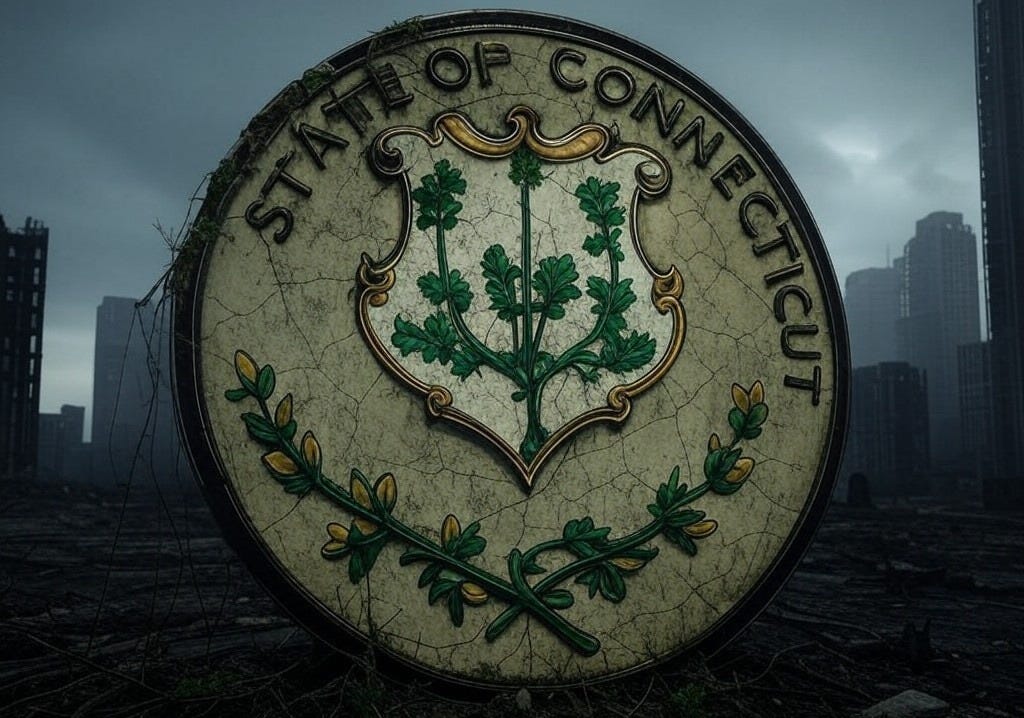
Boyne’s incendiary anti-Semitic rhetoric is deplorable, and no serious journalist or legal analyst should defend his statements.
But the Connecticut establishment’s decision to use lawfare to silence him was an even graver mistake. By prosecuting him for speech, they exposed their own authoritarian impulses.
If Connecticut’s legal system had allowed the press, activists, and civil society to challenge Boyne’s hate speech instead of jailing him, they would have had the moral high ground.
Instead, they criminalized kvetching—turning Boyne from a fringe figure into a symbol of judicial overreach.
And now, Connecticut can’t back down. They must continue the prosecution, or they risk admitting that they broke the Constitution to silence a blogger.
Only Federal Oversight Can End This
The only institution that can clean up Connecticut’s corrupt judiciary is the Trump DOJ. The Justice Department should investigate whether prosecutors, judges, and former justices colluded to criminalize Boyne’s speech.
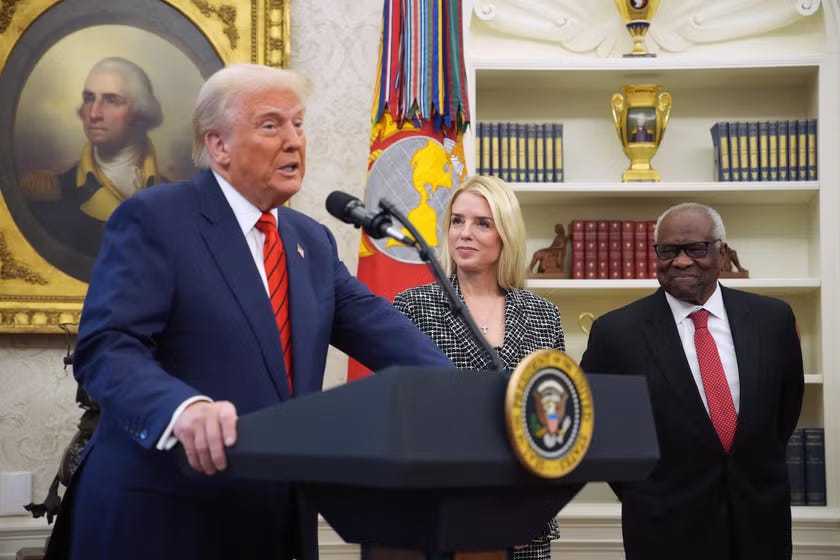
Connecticut may have started with good intentions but has now crossed the Rubicon into weaponized prosecution.
If it insists on continuing the Boyne case, former and current judges may have to answer to federal investigators.
The courts should never be used to silence speech, even if that speech is vile. The First Amendment is absolute, and Connecticut’s judicial establishment has shredded it to cover their misdeeds.
Paul Boyne must walk free. Not because he is a hero. Not because he is innocent. But because his prosecution is an assault on free speech and the Constitution.
If Connecticut refuses to drop this case, the Trump DOJ must intervene. The time for waiting is over. Justice must be restored.



